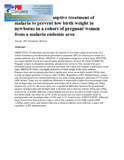| dc.contributor.author | Alusala, DN | |
| dc.contributor.author | Estambale, Benson | |
| dc.date.accessioned | 2013-06-11T12:32:49Z | |
| dc.date.available | 2013-06-11T12:32:49Z | |
| dc.date.issued | 2009-08 | |
| dc.identifier.citation | East Afr Med J. 2009 Aug;86(8):378-86. | en |
| dc.identifier.uri | http://hinari-gw.who.int/whalecomwww.ncbi.nlm.nih.gov/whalecom0/pubmed/20575312 | |
| dc.identifier.uri | http://erepository.uonbi.ac.ke:8080/xmlui/handle/123456789/31597 | |
| dc.description.abstract | OBJECTIVE:
To determine and describe the patterns of low birth weight in newborns of a cohort of mothers given intermittent presumptive treatment (IPT) for malaria prevention in a malaria endemic area of Kenya.
DESIGN:
A longitudinal prospective cohort study.
SETTING:
Got Agulu Health Centre in Usigu Division, Bondo District, Nyanza Province.
SUBJECTS:
Pregnant women of all parities attending antenatal care services. Only women who gave informed consent for themselves and their newborns after birth were eligible to participate in the study.
RESULTS:
Parity was highly predictive of birth weight in the study subjects. Primigravidae and secondigravidae had a significantly lower mean birth weight (2952g) than women of higher gravidity (3214g) p-value <0.0001. Regardless of IPT administration, women who became positive for malaria infection at any point during pregnancy delivered 73.7% of the LBW infants. There was no significant difference in mean birth weights between primigravidae and multigravidae who had parasitaemia at baseline and at delivery (means 2906g and 3062g respectively, p=0.11). However, there was a significant difference between the parasitaemia negative primigravidae and multigravidae at baseline and at delivery (means 2952g and 3204g respectively, p=0.006). Infection with helminths did not have an effect on birth weight. Overall, low birth weight was observed in 9% of the newborns and was most commonly found in primigravidae and secondigravidae (14.8% and 13.1% respectively).
CONCLUSION:
Although many factors have been known to play a role in the causation of low birth weight (LBW <2500g), parity status and malaria infection in malaria endemic areas still play a major role regardless of IPT administration. | en |
| dc.language.iso | en | en |
| dc.publisher | University of Nairobi. | en |
| dc.title | Intermittent presumptive treatment of malaria to prevent low birth weight in newborns in a cohort of pregnant women from a malaria endemic area | en |
| dc.type | Article | en |
| local.publisher | Department of Medical Microbiology | en |

